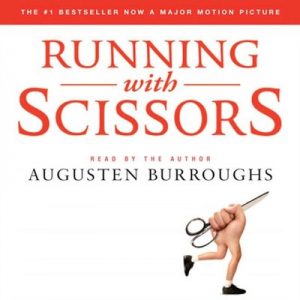Running with scissors
Autorstwa Olga Kulig

Augusten Burroughs’ autobiographical book, Running with Scissors was originally published in 2002.
When life gives you lemons, make lemonade. And when life gives you crazy, unbalanced parents and guardians, describe your childhood and become a respected writer.
That’s the recipe for success in life that Augusten Burroughs, author of the autobiographical book Running with Scissors, used. Of course, if it weren’t for his innate talent, a handful of detachment and a ton of humor added to this recipe, it could have come out a crock. But no, the reader gets a real treat, a bittersweet description of growing up as a “normal” teenager in an abnormal and chaotic world.
The world that Augusten Burroughs grew up in is so improbable, absurd and crazy that the author has nothing left to do but laugh. Turning negative moments into funny ones is a surefire way to survive, a sign of self-preservation and, it seems, the author’s main specialty. So:
America, 1970s.
Starring:
Father – university lecturer with severe depression, aggressive alcoholic.
Mother – an unfulfilled poet, falling deeper and deeper into mental illness.
Older brother – soulless genius who drops out of school and family at age sixteen, later diagnosed as an asperger.
Narrator/author – the younger child in the family, a homosexual who exhibits compulsive behavior.
Dr. Finch – the family’s psychiatrist and therapist, treading on the thin line separating genius from insanity (okay, I’ll spoiler, he’s completely insane).
Dr. Finch’s family – some are actually biological relatives, some are former or current patients, some and some are hard to tell apart.
The book
The book begins with a brawl between the parents, a bloody brawl that the then eight-year-old narrator witnesses. Later, the tension escalates and only gets worse.
The parents’ divorce is predictable. So is the young narrator’s trouble at school. But why does a psychiatrist become Augusten’s legal guardian, and why does the teenage author himself move permanently into Finch’s house? A house that is a mixture of Harry Potter’s imaginary scenery and King’s horror world? A house where everyone does what and when they want, and where a thirteen-year-old is considered an adult. Where the Christmas tree, or rather its remains, still “decorate” the living room in May.
Augusten brilliantly and humorously describes the eccentricity of the inhabitants of the house. Their funny quirks, but also dangerous follies. Friendly relationships, but also extortion, manipulation and exploitation.
This is not all.
She describes her mother’s subsequent love affairs and the lesbian writing workshops she runs in her living room.
He also describes his initiation and first sexual encounters, which by the standards of then and now fall under the heading of molestation of minors, and which were fully condoned by both the author’s mother and Dr. Finch.
And that’s still not all.
There is also an entire chapter devoted to cataloging and deciphering special messages from God sent to the household in the form of Dr. Finch’s excrement.
And that’s still not all…
But will anyone believe it?
-
8 June 2025
Systemowa i narracyjna terapia traumy u dzieci
Systemowa i narracyjna terapia traumy u dzieci – Sabine Vermeire czyli książka dla każdego kto współpracuje z dziećmi.
-
23 October 2024
Mówimy o tym głośno
Najwyższy czas przekazać informacje o tym jak bardzo są potrzebni opiekunowie/rodzice zastępczy, dlaczego ich nie ma i co można zrobić, żeby nie tylko zostali ci którzy już tworzą rodziny zastępcze, ale pojawiali się kolejni kandydaci do ich prowadzenia.
-
15 August 2024
Standardy Ochrony Małoletnich
15 sierpnia 2024, na mocy ustawy Kamilka, w całej Polsce zaczynają obowiązywać standardy ochrony małoletnich. Dzisiaj zaczęły obowiązywać także w Fundacji PROJEKT ROZ.
-
23 March 2024
Niewidzialne Dzieci w kontekstach
Kim są dzieci, które są niewidzialne dla systemu, lub co do których nie widzi się wystarczającego powodu istnienia i życia w godnych warunkach rozwojowych, edukacyjnych, rówieśniczych? Wymykają się, są niewidzialne lub spychane są na margines usług.
-
8 December 2023
105 portretów Polek
Elżbieta Matusiak to bohaterka cyklu “105 portretów Polek”. W grudniu motywem przewodnim jest “Rodzina”.
Taki mój Portret przedstawiła Paulina Zywart.
-
22 January 2024
Współpraca
Podpisanie porozumienia o współpracy pomiędzy Politechniką Krakowską im. Tadeusza Kościuszki Wydziałem Informatyki i Telekomunikacji, Firmą Unit Unicorn i Fundacją PROJEKT ROZ.
-
8 January 2024
Darowizna od opiekunów zastępczych
Zgodnie z art. 14 ust. 4a ustawy o podatku od spadków i darowizn, za zstępnych uważa się również osoby, które przebywają lub przebywały w rodzinie zastępczej …
-
30 November 2023
Nic nie czuję
Na poziomie społecznym chcemy wytłumaczyć (…), kim są ci młodzi ludzie, którzy borykają się z problemami psychicznymi i co sprawia, że są zmuszeni sięgać po pomoc. To słowa twórców filmu “Nic nie czuję”.
-
26 August 2022
NON-FICTION 2022
Rozmowa o pieczy zastępczej, przeprowadzona w czasie Festiwalu Non – Fiction w Krakowie w 2022 roku z Martą Wroniszewską i Elżbietą Matusiak
-
20 June 2023
Deinstytucjonalizacja pieczy zastępczej
Deinstytucjonalizacja. Co o niej wiemy? To droga czy efekt? Czy zmierzamy w słusznym kierunku?
-
30 May 2023
FAL Fun A-Long – Miłość do kwadratu
FAL (CAL+KAL) ‘Miłość do kwadratu’ to wspólna przygoda szydełkowo-drutowa i wsparcie Fundacji PROJEKT ROZ. Jednocześnie propagowanie wiedzy o pieczy zastępczej.
-
14 April 2023
Raport NIK – Za dużo domów dziecka, za mało rodzin zastępczych
Od 1 stycznia 2012 r. obowiązuje w Polsce ustawa o pieczy zastępczej. Zgodnie z jej postanowieniami państwo ma obowiązek zapewnić opiekę zastępczą dziecku, którego rodzice biologiczni z różnych względów nie mogą sprawować nad nim opieki.
-
4 April 2023
The Fosters
The Fosters – amerykański serial dramatyczny. Tak w dwóch słowach to serial o pieczy zastępczej.
-
23 February 2023
Nowelizacja ustawy o wspieraniu rodziny i systemie pieczy zastępczej. Pytania i odpowiedzi. część 1
Nowelizacja ustawy o wspieraniu rodziny i systemie pieczy zastępczej. Pytania i odpowiedzi.
Część 1 – podręcznik -
23 February 2022
MATEXI inspiruje i pomaga
Wspierać można w różny sposób. Taki pomysł na pomaganie ma MATEXI Polska.
-
17 November 2021
Ozdoby świąteczne
Świąteczne ozdoby z różnych krajów świata, różnych kultur, różnych projektów, ale z tym samym przesłaniem: POKÓJ-WSPÓŁPRACA-ZROZUMIENIE
-
31 August 2021
Białe płatki, złoty środek. Historie rodzinne
Paweł Piotr Reszk. Wydawnictwo Agora. rok 2021
-
12 November 2020
Zmiany w Fundacji
Nastąpiły, ustalane od pewnego czasu zmiany w Fundacji. Zmiany w Zarządzie w Radzie i adresie siedziby.
-
31 October 2020
Kompetencje społeczne zawodowych rodziców zastępczych
Jan Basiaga i Iwona Łukasik prezentują badania własne dotyczące kompetencji społecznych zawodowych rodziców zastępczych – Problemy Opiekuńczo-Wychowawcze 2020; 593 (8): 44-58
-
24 July 2021
滋賀はどこにあるか知っていますか?
To cykl spotkań studentów z Uniwersytetu Shiga w Japonii z mieszkańcami “Małego Księcia” w Krakowie. To co poznane / oswojone, staje się przyjazne. Uczymy się od siebie.


